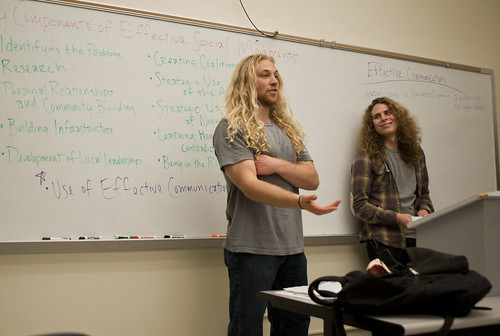
The college restarted in 2009 with help from Connell Persico and Roger Alvarado, two former SF State students who were involved in the ‘68 protest, and has since increased momentum due partly to the Occupy movement.
“It wasn’t very big for a long time until last semester when we decided to teach, and we’ve been working to resurrect it ever since,” said Nelson, a senior environmental studies major. “This semester, it’s actually fairly large. We’re finding what really went on in these social movements, and how we can apply it to our situation here on campus or in San Francisco with the Occupy movement. It’s very comprehensive.”
SF State political science lecturer Kathy Emery knew about the Experimental College through students in the 2009 resurgence, and suggested the idea to teach an experimental class to Nelson and Corwin. She taught both students in her Introduction to Critical Thought course in Spring 2011 and helped them understand how to use their own course curriculum to achieve their educational goals.
“I don’t understand why the administration would want to discourage students from asking and answering their own questions, whether it is how to create a sustainable economy or how to be effective advocates for social justice,” Emery said. “Creating and implementing their own courses, with experienced advising, is the most effective way for students to learn how to think critically.”
College of Arts and Humanities Dean Paul Sherwin first heard about the college Jan. 20 and said he was unsure of how much involvement any one department had with the Experimental College. Unaware of any faculty member of the College of Arts and Humanities who had taken part, Sherwin said the use of the 699 form to receive credit was not in accordance with established policies.
“There are some variations of 699s, but typically they involve an individual student undertaking intensive investigation of a topic under the supervision of a faculty member,” Sherwin said. “In any event, the descriptions of the two ‘Experimental College’ courses I have seen indicate that they are not in compliance with long-established policies at our University. Students are not teachers and they do not assign grades for courses, certainly not for credit-bearing courses.”
Despite a number of fliers posted throughout the campus about the Experimental College, administrators appear to have only just found out about it. In an email, Rosser said that the issue of students who have received credit for past courses would be dealt with by the deans of each college.
“I’m taking 19 units this semester so I’m just taking it for fun,” said Lauren Saint-Erne, 21, a geography major. “I took it for course credit last year.”
Henry York, 23, a graduate student in political science, has been a part of the Experimental College since it restarted in 2009.
In the college that year, he facilitated his own two-hour course with SF State art major Andrew Cardoza. Maintaining six or seven participants through the semester, they focused on expanding worldviews and some students received course credit, according to York. He believes that the continuation of the Experimental College is a testament to the legitimacy of the college’s model.
“It’s really cool to honor that history at SFSU, to resurrect it now in the face of a new challenge: the budget cuts,” said York. “We’re not getting the education that we deserve, so we’re making it happen for ourselves.”
The Experimental College’s ability to give course credit is in jeopardy, but the enjoyment that comes from facilitating the course was apparent.
“I really enjoy this, as most of you can tell,” said Corwin during the closing remarks of the second activism class. “I really enjoy learning and being in both roles.”





BETTY TURNBULL • Feb 24, 2012 at 8:12 pm
Wow! Congratulations on completing everything a professor MUST do and having such a manner for inspiring the students who signed for your classes.
With your expertise from home and tutoring math so Fabulously for underclass students who were so needy for help in their classes, your intense preparation is certainly Wonderful. All the family are so proud of your accomplishment. G-Betty